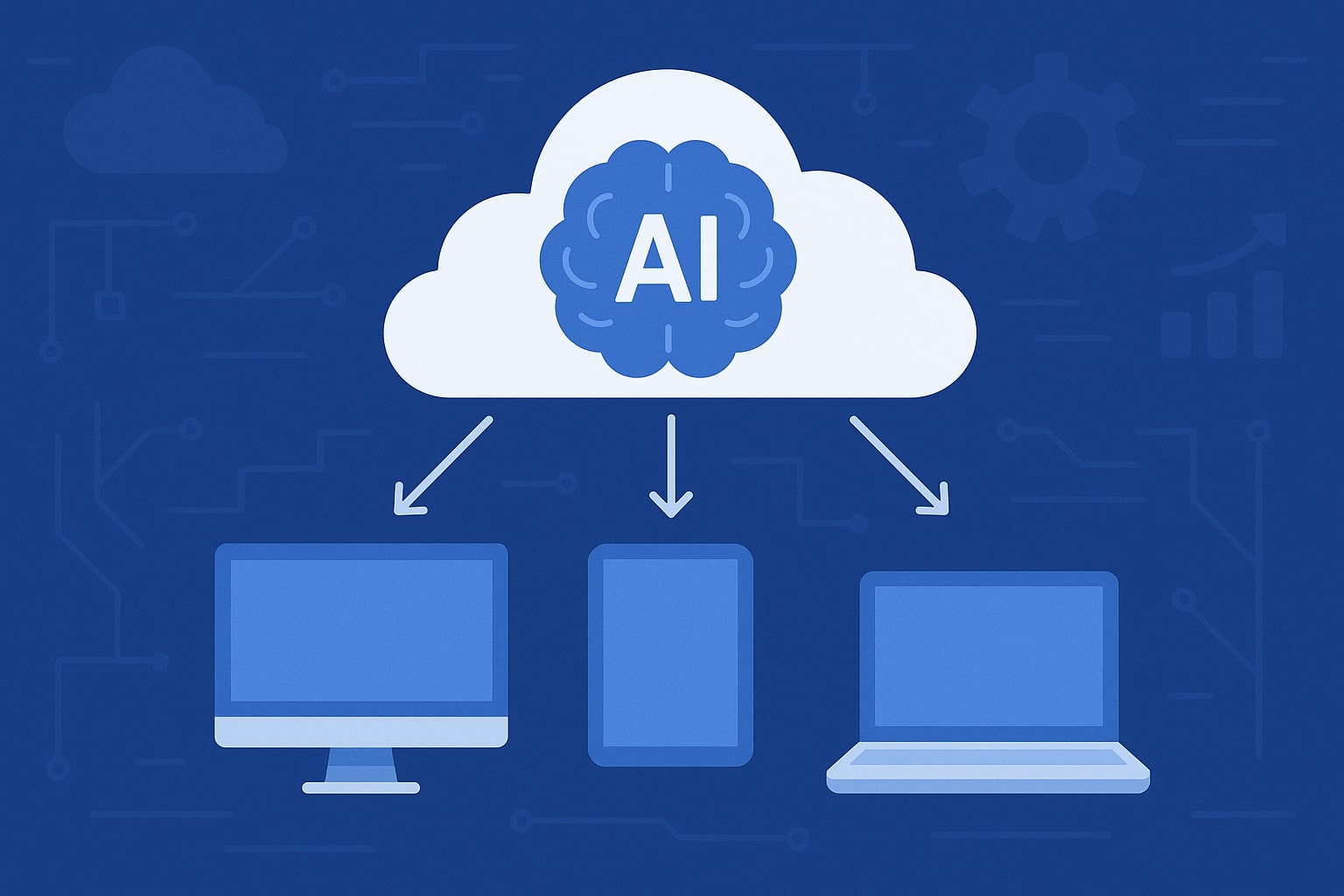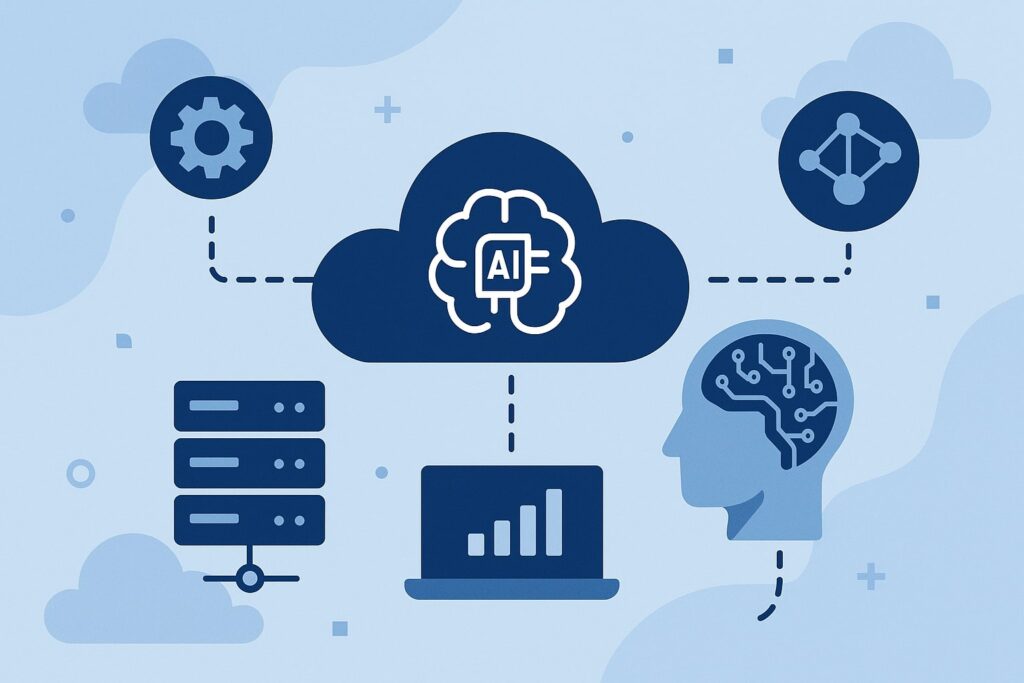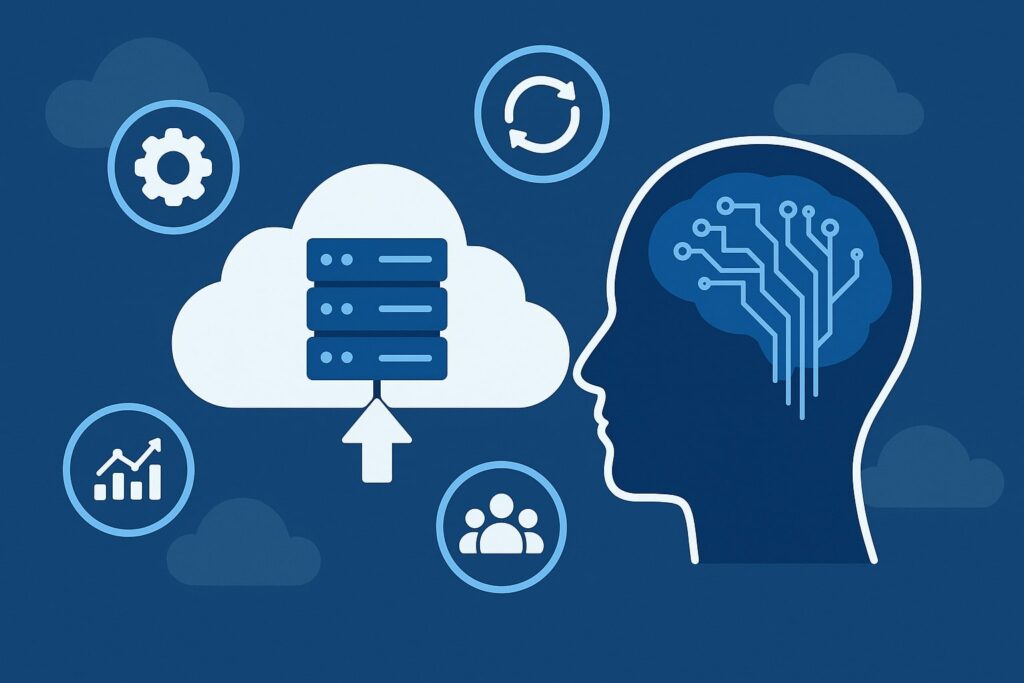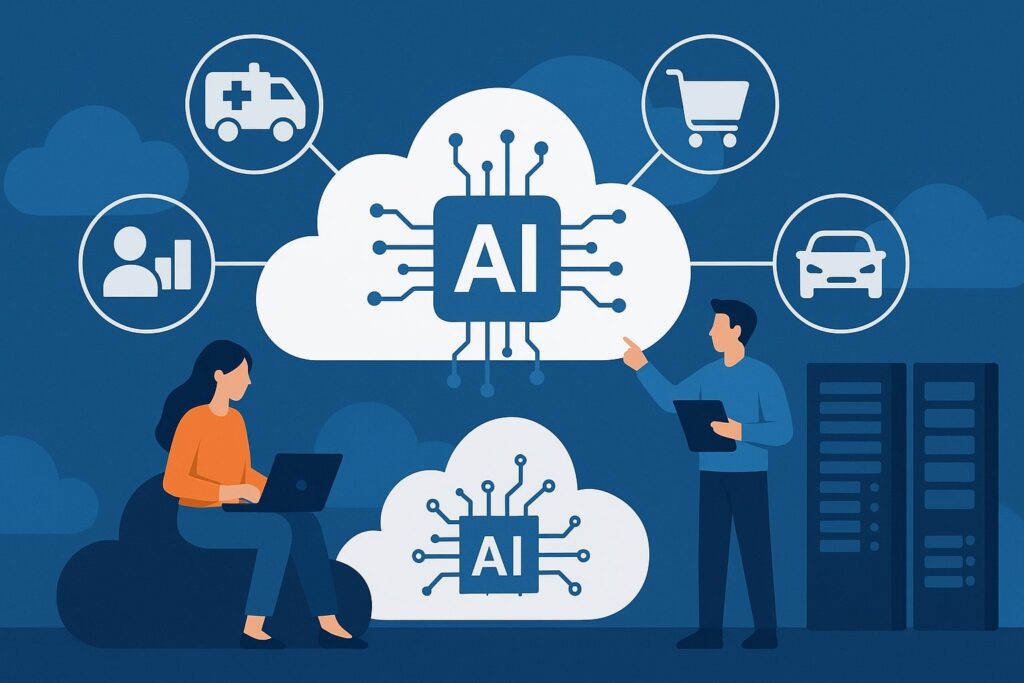
By hostmyai September 29, 2025
Artificial Intelligence (AI) has moved from being a futuristic concept to a driving force behind innovations in nearly every industry. From personalized recommendations on streaming platforms to autonomous vehicles and intelligent chatbots, AI is everywhere.
However, behind the scenes, these applications require massive computational power, scalable infrastructure, and reliable data storage to function effectively. This is where cloud hosting comes in.
Cloud hosting provides the backbone that allows AI applications to be developed, trained, deployed, and scaled without requiring organizations to invest heavily in on-premise infrastructure.
By leveraging the cloud, businesses can access virtually unlimited resources on demand, experiment with new AI models, and deliver intelligent services to customers globally.
In this article, we’ll explore in detail how cloud hosting powers modern AI applications. We’ll break down its benefits, architectures, real-world use cases, and future trends. This guide is designed for business leaders, developers, and anyone interested in understanding the synergy between AI and the cloud.
The Foundation of Cloud Hosting for AI

At its core, cloud hosting refers to delivering computing services—including servers, storage, databases, networking, and software—over the internet. Instead of maintaining physical servers, businesses can rent resources from cloud providers such as Amazon Web Services (AWS), Microsoft Azure, or Google Cloud.
For AI specifically, this model is a game-changer. Training AI models often requires massive computational capacity, including specialized hardware like GPUs (Graphics Processing Units) or TPUs (Tensor Processing Units).
Purchasing and maintaining such infrastructure is not only expensive but also inefficient for many organizations whose usage fluctuates. With cloud hosting, these resources are available on-demand, meaning businesses only pay for what they use.
Cloud providers also integrate advanced AI and machine learning (ML) platforms into their offerings. For example, AWS provides SageMaker, Azure has Machine Learning Studio, and Google Cloud offers Vertex AI.
These platforms allow developers to build, train, and deploy models without needing deep expertise in infrastructure management.
Another foundational aspect is scalability. AI workloads often spike during training or high-traffic periods. The cloud seamlessly scales resources up or down, ensuring smooth performance.
This elasticity is critical for AI systems that need to process fluctuating amounts of data in real-time, such as fraud detection platforms or recommendation engines.
Security and compliance also play a major role. Cloud hosting providers invest heavily in securing data, complying with regulations such as GDPR or HIPAA, and offering features like encryption, identity management, and audit logging.
For AI applications handling sensitive data—like healthcare diagnostics or financial predictions—these safeguards are essential.
Ultimately, the foundation of cloud hosting for AI rests on four pillars: on-demand access to resources, scalability, integration with AI platforms, and robust security. These create an environment where innovation is not limited by infrastructure constraints but instead empowered by them.
Benefits of Cloud Hosting in AI Development

The benefits of cloud hosting for AI extend beyond raw computational power. It touches nearly every aspect of the AI lifecycle, from data preparation to deployment and monitoring. Below are some of the most critical advantages:
1. Cost Efficiency
Building AI infrastructure in-house requires large upfront capital investments in hardware, cooling systems, maintenance staff, and ongoing upgrades. Cloud hosting eliminates this burden by shifting costs to a pay-as-you-go model. Companies can start small and expand as their needs grow, ensuring budgets align with project stages.
2. Faster Development Cycles
Cloud platforms provide pre-built AI tools, frameworks, and APIs, reducing the time it takes to build applications. Developers can quickly experiment with different algorithms, test models, and integrate AI into applications without reinventing the wheel. This accelerates innovation and reduces time-to-market.
3. Global Reach
AI applications often need to serve users worldwide. Cloud hosting providers operate data centers across continents, ensuring low-latency access for end-users. Whether you’re deploying a voice assistant in the U.S. or a recommendation engine in Asia, the cloud enables consistent performance globally.
4. Collaboration and Accessibility
Cloud environments enable distributed teams to collaborate seamlessly. Data scientists, developers, and business analysts can access shared datasets, models, and results in real-time, regardless of location. This fosters innovation and reduces bottlenecks.
5. Flexibility and Customization
From choosing the type of compute instances (CPU, GPU, TPU) to integrating specific frameworks like TensorFlow, PyTorch, or Scikit-learn, cloud hosting provides unparalleled flexibility. Organizations can tailor their AI infrastructure to meet unique requirements.
6. Continuous Updates
Cloud providers continuously update their platforms with the latest hardware and software advancements. Businesses benefit from cutting-edge technology without the hassle of manual upgrades.
The benefits are clear: cloud hosting democratizes AI by lowering barriers to entry and enabling organizations of all sizes to harness its power. This has transformed industries from healthcare to retail, making AI a practical reality rather than an exclusive privilege.
Cloud Architectures that Support AI Workloads
To understand how cloud hosting powers AI, it’s essential to examine the architectures that underpin these workloads. AI systems are resource-intensive, and their success depends on carefully orchestrated infrastructure.
1. Infrastructure as a Service (IaaS)
IaaS provides raw computing resources such as virtual machines, storage, and networking. Organizations can configure these resources to build their AI stack from scratch. While this offers flexibility, it also requires more management expertise.
2. Platform as a Service (PaaS)
PaaS takes things a step further by providing pre-configured environments for developing and deploying AI applications. Platforms like Google’s Vertex AI abstract much of the complexity, allowing developers to focus on algorithms and data rather than infrastructure.
3. Serverless Computing
In serverless models, developers don’t manage servers at all. Instead, they write functions that execute in response to triggers, such as an incoming dataset. This is ideal for AI workloads that are event-driven, like analyzing social media mentions in real time.
4. Hybrid and Multi-Cloud
Many organizations adopt hybrid cloud (mixing on-premise and cloud) or multi-cloud (using multiple providers) strategies. This approach enhances flexibility, avoids vendor lock-in, and ensures compliance by storing sensitive data locally while leveraging cloud for heavy AI tasks.
5. Specialized Hardware
AI workloads thrive on parallel processing. Cloud providers offer specialized hardware like GPUs, TPUs, and FPGAs (Field-Programmable Gate Arrays) optimized for training and inference tasks. These accelerators drastically reduce the time required to train large models.
6. Data Management Layers
AI depends on high-quality data. Cloud architectures include data lakes, warehouses, and pipelines that ensure seamless ingestion, processing, and retrieval of datasets. Tools like AWS Glue or Azure Data Factory simplify these workflows.
Each of these architectures supports different stages of the AI lifecycle. By combining them strategically, organizations can achieve the perfect balance of performance, cost, and flexibility.
Real-World Applications of AI in the Cloud

The marriage of AI and cloud hosting isn’t just theoretical—it’s shaping industries worldwide. Let’s look at some real-world use cases where cloud-powered AI is making a tangible difference:
Healthcare
Cloud-hosted AI applications analyze medical images, predict disease progression, and personalize treatment plans. Hospitals use cloud platforms to securely store and process vast patient data while leveraging AI for faster diagnoses.
Finance
Banks use AI in the cloud to detect fraud in real-time, assess credit risks, and personalize customer services. The scalability of the cloud ensures that financial institutions can handle millions of transactions per second without compromising accuracy.
Retail and E-Commerce
Recommendation engines, demand forecasting, and supply chain optimization are powered by AI hosted in the cloud. Retailers can dynamically analyze customer behavior and adjust pricing or inventory in real-time.
Autonomous Vehicles
Self-driving cars generate terabytes of data daily. Cloud platforms process this information to improve algorithms, simulate scenarios, and update vehicle software globally.
Agriculture
AI models in the cloud help farmers optimize crop yields by analyzing weather patterns, soil conditions, and satellite imagery. Cloud scalability ensures these services are accessible even in remote regions.
These examples illustrate how cloud hosting is democratizing access to advanced AI capabilities, enabling even small organizations to leverage innovations once reserved for tech giants.
Challenges of Cloud-Hosted AI
While the benefits are vast, organizations must also navigate challenges when adopting cloud hosting for AI:
- Cost Management: Pay-as-you-go can become expensive without proper monitoring.
- Data Privacy: Sensitive data stored in the cloud requires strict compliance measures.
- Latency: For real-time applications, cloud latency may pose performance issues.
- Vendor Lock-In: Dependence on a single provider can limit flexibility.
- Skill Gaps: Managing AI in the cloud requires specialized expertise.
Addressing these challenges involves adopting best practices such as monitoring costs, encrypting data, using edge computing to reduce latency, and training staff.
Future of AI and Cloud Hosting
The future of AI and cloud hosting is incredibly promising. Key trends include:
- Edge AI: Processing data closer to where it’s generated, reducing latency.
- Quantum Computing in the Cloud: Offering unprecedented computational power for AI research.
- Sustainability: Cloud providers investing in green data centers to reduce environmental impact.
- Explainable AI (XAI): Tools integrated into cloud platforms to make AI decisions more transparent.
These innovations will make AI even more accessible, reliable, and impactful in the coming years.
FAQs
Q1: Why is cloud hosting important for AI?
Answer: Cloud hosting provides the computational power, scalability, and flexibility needed for developing, training, and deploying AI applications efficiently.
Q2: Can small businesses use AI in the cloud?
Answer: Yes. Cloud platforms offer pay-as-you-go models, making AI accessible to startups and small businesses without heavy infrastructure costs.
Q3: Is cloud-hosted AI secure?
Answer: Most major cloud providers implement enterprise-grade security measures including encryption, compliance certifications, and monitoring to ensure data protection.
Q4: What industries benefit most from AI in the cloud?
Answer: Healthcare, finance, retail, transportation, and agriculture are among the top beneficiaries of cloud-hosted AI.
Q5: What is the future of AI in the cloud?
Answer: Expect advancements in edge computing, quantum AI, sustainability initiatives, and tools that improve transparency and governance.
Conclusion
Cloud hosting and AI are two of the most transformative technologies of our time, and together, they are reshaping the digital landscape.
Cloud infrastructure provides the foundation of scalability, flexibility, and cost-efficiency that AI needs to thrive. Meanwhile, AI brings intelligence and automation that maximizes the potential of cloud investments.
For businesses, the message is clear: embracing cloud-hosted AI isn’t just about staying competitive—it’s about unlocking entirely new opportunities for innovation and growth.
As technology continues to advance, the synergy between AI and the cloud will power the next wave of breakthroughs that define our future.